|
|
DETAILED ITINERARY >>
DATES AND PRICES >>
PRACTICAL INFORMATION >>
PHOTO GALLERY >>
COUNTRY FACTS
BURKINA FASO >>
TOGO>>
BENIN >> |
|
|
Mud Palaces and Voodoo Ceremonies - a Tour to Burkina Faso - Benin - Togo
Accommodation
On our trip through Burkina Faso, Benin and Togo we stay in clean thoroughly selected 2-3-stars-hotels. The rooms have en suite facilities, electricity and water supply and air condition or fan. The hotels at Ouagadougou, Bobo Dioulasso, Banfora, Natitingou, Ouidah, Grand Popo and Lomé have clean swimming pools.
Here is a selection of the hotels used on our tour:
|
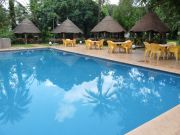
| Hotel OK Inn, Ouagadougou | |
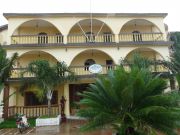
| Hotel Cascades Palace, Banfora | |
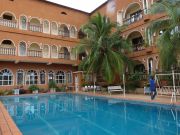
| Hotel Auberge, Bobo Dioulasso | |
|
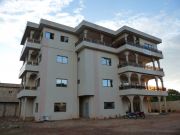
|
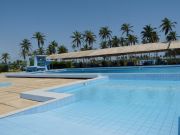
| Hotel Jardin Brésilien, Ouidah | |
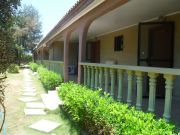
|
Airlines
Airlines with scheduled flights to Burkina Faso include Air France offering daily flights to Ouagadougou via Paris and three flights per week (Tuesday, Friday and Saturday) from Lomé to Paris. Brussels Airlines has two scheduled flights per week (Wednesday and Sunday) to Ouagadougou via Brussels and two return flights per week (Friday and Monday) from Lomé to Brussels. For further information regarding flights schedules, reservation, connection flights please consult the airlines’ websites: www.brusselsairlines.com and www.airfrance.net.
The itinerary of our group guided tours with fixed departure dates matches the Air France flight schedule. If you choose another airline there may be modifications to the itinerary and/or additional cost due to extra overnight accommodation and extra transfer expenses. If you book a tailor-made trip with us you can fly the airline of your choice. We will be pleased to provide you with a regarding your reservation.
Climate
Burkina Faso
Burkina Faso is divided into three climatic zones, the Sahelian zone, situated in the north of the country, south to it the Sudano-Sahelian zone and the Sudano-Guinean zone which covers the south and southwest of Burkina Faso. The country has a primarily tropical climate with two alternating seasons: a long dry season and a short rainy season. In the Sahelian zone, covering about 25% of the country, the rainy season runs sometimes only two months with maximum rainfall of up to 300mm a year. The Sudano-Sahelian zone is the largest climatic region, covering half of Burkina Faso. The rains in this area tend to start in May/June and to dry up in September/October. Rainfall figures are highest in the Sudano-Guinean zone which receives up to 1,300mm a year. The rains here tend to start in May and are over by October. The temperatures average between 25°C and 30°C, March, April and May being the hottest months. Burkina Faso is coolest in January and February. During the dry season the harmattan winds blow, bringing dust from the Sahara.
Benin
There are two climatic zones in Benin. The south has a typically equatorial climate with two rainy seasons and two dry seasons a year. In the south the rainy seasons occur from April/May to July and from October to November. In August and September the rains are interrupted by a short dry season. There is a long dry season between December and April. The annual temperature averages 30°C (day temperature) and 23°C (night temperature). The relative humidity is high, it reaches up to 90%. A dry wind from the Sahara called the harmattan blows from December to April. The area receives an annual rainfall of about 2,000mm.
Northern Benin has only one wet season from June to September, with most rain in August and a dry season from October to May in which the harmattan blows for three or four months, bringing cooler temperatures and less humidity.During this period there is a lot of dust in the air and the sun often becomes completely obscured. Temperatures range between 29°C – 38°C at day and drop at night to 16°C to 26°C. This part of the country has an annual rainfall of 1,000 to 1,200mm and relative humidity is between 30 and 70 %.
Togo
The climate in Togo is tropical and wet all year round with an average temperature of 30°C in the north and 27°C along the coast. The hottest temperatures occur in February and March. In December and January the harmattan blows from the northeast.
In the north of the country there is one rainy season from May to October with most rain in August. This is also the coolest month of the year. The driest month is January, that’s when the relative humidity is roughly over 20%.
In the south two rainy seasons occur, the principal one from April to June and a shorter one in October and November. The wettest months are June and October, when the relative humidity reaches 80 %. The driest month is December and the hottest month is March when temperature averages about 32°C. The coolest month is August with an average temperature of about 27°C.
Clothing
Light short-sleeved cotton clothing is recommended for the days and a long-sleeved shirt and trousers for the evenings which will help you to fend off mosquitoes and face the cooler temperatures in the north of Benin and Burkina Faso. In Burkina Faso shorts and short skirts are ill-advised for women. It is also unusual for men to wear shorts in Burkina. In the rainy season you need a waterproof jacket and/or an umbrella. (see chapter “climate”). In many hotels there is a laundry service on offer, so you can get your washing done. As for footwear, you should carry with you a good pair of walking shoes for our hiking tours and a pair of sandals. Thongs are useful in shower and pool areas. Don’t forget your swimwear! You will have the opportunity to swim in the sea, and some of our hotels have clean swimming pools.
Communications
Burkina Faso
International and national calls can be made from post offices and hotels. The prefix for UK is 0044, for USA and Canada 001, for Burkina Faso 00226. As in many other African countries, the mobile industry in Burkina Faso is booming, and coverage is excellent across the country. For detailed information please contact your provider prior to departure. If you have a GSM phone and it has been „unlocked“, it is possible to buy a local SIM card for about 7$ and buy top-ups. International calls to UK and USA cost about 400 to 500 CFA per minute.
Internet access is widely available in Ouagadougou and prices not expensive, although connections are often slow.
Benin
International and national calls can be made from post offices and hotels. The prefix for UK is 0044, for USA and Canada 001, for Benin 00229. As in many other African countries, the mobile industry in Benin is booming, and coverage is excellent across the country. For detailed information please contact your provider prior to departure. If you have a GSM phone and it has been „unlocked“, it is possible to buy a local SIM card for about 7$ and buy top-ups. The coverage of all national providers is constantly increasing. For cheap phone calls to Europe and USA you also can buy prepaid phone cards (for example Nasuba).
Internet access is widely available in all big cities and prices not expensive, although connections are often slow. The best connections are found in Cotonou.
Togo
International and national calls can be made from post offices and hotels. The prefix for UK is 0044, for USA and Canada 001, for Togo 00228. As in many other African countries, the mobile industry in Burkina Faso is booming, and coverage is excellent across the country. For detailed information please contact your provider prior to departure.
Internet access is widely available in all big cities and prices not expensive, although connections are often slow. The best connections are found in Lomé.
Electric Supply & Plugs
220 volts alternating current. Generally, you can recharge your batteries in your hotel room without a problem. All three countries use two-pin continental-style plugs, so you will probably need an adapter. Please note that power cuts are frequent.
Food and drinks
In the itinerary we state which meals are included on each day.
Food included in the breakfast varies according to hotel standard. Most hotels serve bread, butter, jam, sometimes honey and processed cheese or omelette for breakfast. It also includes tea or coffee. Upmarket hotels usually serve buffet breakfast. Dinner we usually take in the restaurants of our hotels or in clean, thoroughly selected restaurants in town. In many places international cuisine is served.
Burkina Faso
The Burkinabé staple is the rather tasteless tô, a maize-, millet- or sorghum-based dough mixed with water, that is usually combined with a vegetable sauce or a sauce made of ladies’ fingers, baobab leafs or groundnuts. These sauces are also served with rice and couscous made of fonio or cassava. The sauces can be quite spicy. Riz gras is another popular dish consisting of rice fried in oil with tomato paste and onion. It is usually served with fried fish or meat. Fufu is a popular starch-based staple originally from the coast. There are also plenty of meat dishes on offer. Beef, mutton, goat, chicken and bush-meat are available throughout the country. Guineafowl known as pintade in French and fish are often seen on menus in Burkina Faso. Popular side dishes in restaurants are fried plantain known as aloco and fried sweet potatoes or yam. Caterpillars are a popular food source as they are rich in protein.
Tap water should be boiled or filtered before you drink it. In all bigger cities you can buy mineral water in bottles. You should try bissap, a thirst-quenching juice made of the purple petals of the hibiscus flower. Other tasty juices are available like tamarind or ginger juice and depending on the season baobab juice. Beer is also produced in Burkina Faso, the most popular brand is Brakina. Locally brewed millet beer known as dolo or chapalo is available in the villages.
Benin
Benin is renowned throughout West Africa for having the best food in the region. The secret of its cuisine lies in the delicious spicy sauces the dishes are served with. The Beninese sauces often include meat and vegetables, other ingredients are ladies’ fingers and groundnut. They are served with rice or couscous or other popular staples like akassa which is made of fermented maize; amiowo cooked with maize and palm-oil which gives it the red colour; piron made of yam or atieke, a typical dish made of mashed cassava. Agouti, a kind of rat-like rodent also known as grasscutter or cane rat, is very likely to be found on the menus as it is Benin’s most popular bush-meat.
The coast is great for delicious fish and seafood dishes.
Tap water should be boiled or filtered before you drink it In all bigger cities you can buy mineral water in bottles. There is a huge variety of exotic fruits in Benin which are used to make delicious juices.
Togo
One of Togo’s most popular dishes is Fufu made of mashed yam served with a spicy sauce made with red palm oil or groundnut oil. Some yam tubers that are used weigh over 5kg. A porridge called pate which is made of maize is very popular and usually combined with a sauce made of okra or dried fish. Meat is an important food in Togo, though very expensive. Therefore most people eat the cheaper goat meat or chicken. Other popular dishes are rice with beans and beans with gari (roasted cassava), chilli and palm kernel oil.
There is a large variety of fruit in Togo, including pineapple, papaya, mango, banana and coconut.
Tap water should be boiled or filtered before you drink it In all bigger cities you can buy mineral water in bottles. A typical thirst-quenching drink is bissap, a tea-like drink made of hibiscus petals which is usually served cold. Soft drinks like Coca cola and Fanta are available throughout the country. Togo is a renowned beer producer offering a variety of different brands. Along the coast and in the hinterland there are a lot of illicit distilleries where the popular sodabe, a clear-coloured moonshine distilled from palm wine is made.
Health
A Yellow Fever vaccination and certificate is a compulsory requirement for entry into Burkina Faso, Togo and Benin (see visa requirements). You should always carry the certificate with you while being in Africa.
Immunisations against tetanus, diphtheria, polio and hepatitis A are recommended by the World Health Organization, regardless of your destination. For other vaccinations and prophylactic measures please consult your doctor, travel clinic or tropical medical bureau before departure.
Travel clinics:
UK
-
Berkeley Travel Clinic, 32 Berkeley St., London WIJ 8EL, Tel.: 020 7629 6233
-
Cambridge Travel Clinic, 41 Hills Rd, Cambridge CB2 1NT, Tel.: 01223 367362
-
-
-
Hospital for Tropical Diseases Travel Clinic, Mortimer Market, Capper St. off Tottenham Court Road, London WC1E 6JB, Tel. 020 7388 9600, www.thehtd.org
-
InterHealth Travel Clinic, 111 Westminster Bridge Road, London, SE1 7HR, Tel.: 020 7902 9000, www.interhealth.org.uk
-
USA:
-
Centres for Diesease Control, 1600 Clifton Rd., Atlanta, GA 30333, Tel.:(800) 232 4636 or (800) 232 6348
-
IAMAT, International Association for Medical Assistance to Travellers, 1623 Military Rd., 279 Niagara Falls, NY14304-1745, www.iamat.org
Canada:
-
IAMAT, Suite 1, 1287 St. Clair Av W, Toronto, Ontario, M6E 1B8, Tel.: 416 652 0137, www.iamat.org
-
TMVC, Suite 314, 1030 W Georgia St., Vancouver, BC V6E 2Y3, Tel.:888 288 8682, www.tmvc.com
For further health information visit following websites:
www.masta-travel-health.com
www.fitfortravel.nhs.uk
www.iamat.org
To prevent traveller’s diarrhoea, peel fresh fruits before eating them and avoid fresh salads and ice cubes in basic restaurants. Be careful and very selective when eating or drinking in street stalls and make sure that meat is always well cooked and plates and serving utensils are clean. Don’t drink hastily ice-cold drinks. Consult your doctor before departure for appropriate medication and rehydration mixtures.
The best prevention of malaria is to avoid being bitten. The evening wear clothes covering your entire body and use mosquito repellent. Sleep under a mosquito net and/or turn AC or fan on. For further prophylactic measures consult a specialist for tropical diseases.
Keep away from street dogs, monkeys and other mammals that could carry rabies. Avoid bathing in standing bodies of water because they are high-risk areas for bilharzia. Be careful while bathing in the sea because undercurrents and breaking waves are very dangerous even for strong swimmers the seas off Benin being particularly risky.
Literature
Travel guides:
West Africa, Lonely Planet, 7th edition, published Oct 2009
Burkina Faso, Bradt Travel Guide, 2nd edition, published October 2011
Benin, Bradt Travel Guide, first published February 2006
The Rough Guide to West Africa, 5th edition, published June 2009
Novels and biographies:
Bruce Chatwin, The Viceroy of Ouidah, Vintage, 1998
Money
The CFA franc (Communauté Financière Africaine) represented on international banking systems by XOF, is the common currency of Burkina Faso, Benin and Togo. Exchange rates are $1 = 521 CFA (July 2012), £1 = 817 CFA (July 2012), €1 = 655.95 CFA. The CFA franc is pegged directly to the Euro. Notes are in denominations of CFA 10,000, 5,000, 2,000 and 1,000 and since November 2012 there is also a note of 500 CFA, coins come in CFA500, 250, 200, 100, 50 and 25. Coins of CFA 10 or 5 exist, but they are extremely rare.
Please note that finding change can be very difficult at times, particularly in small shops, restaurants, taxis and street stalls, so you should always have a good supply of cash money in small denominations or coins.
Burkina Faso
Banking hours in Burkina Faso vary according to the bank and its location. Generally speaking, most of them open very early, close for a long lunch break and reopen in the afternoon, so you should be able to find an open bank from 07.15 to 11.00 and from 15.30 to 17.00, Mondays to Fridays.
You can change cash money in banks, some hotels, foreign exchange bureaus (Bureau de change) and in some Lebanese supermarkets (like branches of Marina Market). The best hard currency to bring is euros, some banks and money changers also change US dollars. In Ouagadougou and Bobo Dioulasso BECIA-B and SGBB banks are equipped with ATM machines, allowing you can withdraw money using your Visa card. The banks in other towns do usually not accept foreign credit cards. Cashpoints are sometimes not working or malfunctioning, so do not count on them. Please note, that most banks and cashpoints only accept Visa card. Mastercard, American Express or other credit cards are rarely accepted. Only very few big hotels, restaurants or supermarkets, such as Marina Market accept payment with credit card. EC Maestro card is an absolute no-go everywhere in Burkina Faso. While travellers’ cheques offer a greater security, changing them can be time consuming and commission is very high. You will be asked to produce both your passport and the receipt you get from your bank when purchasing them. Travellers’ cheques are only accepted by some bigger banks. They should be issued in euros or US dollars.
Benin
You can change cash money in banks and some bigger hotels. Normal banking hours are from 09.00 to 12.30 and 15.00 to 17.00, Mondays through Fridays. The easiest way to change money is to change cash in euros. Some banks also give you cash advance on your Visa card (SGBBE at Cotonou). Changing euros in foreign exchange bureaus (Bureau de change) is less time consuming and cheaper than in banks. In Cotonou and Parakou there are banks equipped with ATM machines, allowing you can withdraw money using your Visa card. The banks in other towns, however, do usually not accept foreign credit cards. Cashpoints are often not working or malfunctioning, so do not count on them. Please note, that most banks and cashpoints only accept Visa card. Mastercard, American Express or other credit cards are generally not accepted. In Benin it is practically impossible to use the credit card as a means of payment EC Maestro card is an absolute no-go everywhere in Benin. While travellers’ cheques offer a greater security, changing them can be time consuming and commission is very high. You will be asked to produce both your passport and the receipt you get from your bank when purchasing them.Travellers’ cheques can only be reliably changed in Cotonou.
Togo
You can change cash money in banks, some hotels and foreign exchange bureaus (Bureau de change) in Lomé and other bigger cities. Normal banking hours are from 07.30 to 12.00 Uhr and from 14.30 to 17.00, Mondays through Fridays The easiest way to change money is to change cash in euros. Changing euros in foreign exchange bureaus (Bureau de change) is less time consuming and cheaper than in banks. Some banks in Lomé are equipped with ATM machines, allowing you can withdraw money using your Visa card. But with cashpoints being often malfunctioning, you should not count on them. Please note, that most banks and cashpoints only accept Visa card. Mastercard, American Express or other credit cards are generally not accepted. In Togo it’s practically impossible to use your credit card as a means of payment. EC Maestro card is an absolute no-go everywhere in Togo. Some banks in the larger cities offer travellers’ cheques services. While travellers’ cheques offer a greater security, changing them can be time consuming and commission is very high. You will be asked to produce both your passport and the receipt you get from your bank when purchasing them.
Photography
All three countries are real treasure troves for passionate photographers. Whether the picturesque stilt village of Ganvié, the impressive mud castles of the Somba, the colourful dwellings of the Kassena or the animals in the national parks, there are countless photographic subjects.
Before you snap people please ask permission. A small friendly conversation can help you to break the ice and win your subject’s sympathy. Particularly in the animistic parts of the countries there are sacred places where photography is not allowed. Please follow your local guide’s instructions. Some places charge a photo fee (e.g. the Python temple and Sacred Forest in Ouidah and the fetish market in Lomé). Taking pictures is not allowed inside the museums. It is strictly forbidden to take pictures of military buildings and people wearing uniforms, airports, dams, bridges, power plants, police stations, control posts along the roads and border posts!
Safety
The danger most likely to affect a tourist is pick-pocketing, particularly in busy markets, bus stations, in crowds in the streets or in shared taxis. Bag snatchers are few, but can occasionally strike, speeding past on mopeds.Do not wear expensive jewellery or carry large amounts of cash or expensive items such as cameras. You should keep belongings close when walking down streets. We recommend you to keep your documents, cash money, credit card and cheques in a skin-hugging hidden money-belt or a button-up chest pocket. Always travel with photocopies of your documents and keep them in a separate bag.
Avoid walking around the streets at night, especially alone.During late evening or around/after midnight, we recommend you to use a taxi.
For up-to-date information and safety and security advice about your destination please check your government’s travel advisory: www.fco.gov.uk, www.travel.state.gov, www.voyage.gc.ca
Burkina Faso
Demonstrations have been occurring more frequently in Burkina Faso since February 2011. Although the situation has since calmed down again you should avoid all demonstrations and public gatherings. Unfortunately the crime rate has increased in the past few years, so travellers should be vigilant.
In case of emergency please contact your embassy or representation in Burkina Faso:
i
For UK:
There is no British Embassy in Burkina Faso. The British Ambassador to Burkina Faso resides in Accra.
Address:
British200 High Commission
Osu Link
Off Gamel Abdul Nasser Avenue
PO Box 296
Tel.: +233 302 213 250 or +233 302 213
Fax: +233 302 213 274
Office hours: Monday - Thursday: 07.30 to 15.30, Friday: 07.30 to 13.00
There is a British Honorary Consul, Mr Patrick de Lalande, who can only offer limited consular assistance in an emergency.
Address:
Mr. Patrick de Lalande
Honorary Consulate of the UK in Burkina Faso
01 BP 6490 Ouagadougou 01
Burkina Faso
Based at ICI, Initiatives Conseil International
Impasse Thévenoud
Mobile: +226 70203982
Tel: +226 50 30 88 60
Fax: +226 50 31 25 43
E-mail: consulat-uk@fasonet.bf
For USA :
Embassy of the United States of America
Ouagadougou, Burkina Faso
Rue 15.873
Avenue Sembène Ousmane
Ouaga 2000, Secteur 15
Tel: (226) 50-49-53-00
Fax: (226) 50-49-56-28
E-mail: amembouaga@state.gov
American citizen services are scheduled as follows:
Monday, Wednesday, Thursday: from 2.00 pm to 4.30pm, Tuesday: from 8.00am to 4.30pm, Friday from 8.00am to 11.30am
For Canada :
Embassy of Canada
316 Professeur Joseph Kizerbo ave.
01 P.O. Box 548
Ouagadougou 01
Tel: +226 50 31 18 94 station 3000
Fax: +226 50 31 19 00
E-mail:ouaga@dfait-maeci.gc.ca
Office hours: Monday to Thursday: 08:00 – 13:00 and 14:00 – 17:00, Friday: 08:00 – 13:30
Benin
Benin is a rather safe country. There is very little crime.
In case of emergency you can contact your embassy or representation in Benin:
For UK:
There is no formal British representation in Togo. In case of an emergencyBritish Nationals should contact the British High Commission in Accra
Address:
British High Commission in Accra
Osu Link
Off Gamel Abdul Nasser Avenue
P.O. Box 296
Tel.: +233 302 213 250; fax: +233 302 213 200
There is a Community Liaison Officer in Benin, but this should be used for consular emergencies only.
Address:
Mr Simon Collins
The British School of Cotonou
Haie Vive, 08 BP 0352
Cotonou, Benin
Tel: +229 2130 1274
Fax: +229 30 61 95
Mobile phone +229 95301951
E-mail : simoncollins@gmail.com
For USA:
American Embassy
01 BP 2012 Cotonou
Benin
Tel. (229) 21 30 06 50
Fax: (229)21 30 03 84
Office hours: Monday to Thursday from 8:00 to 12:30 and from 13:30 to 17:00, Friday from 8:00 am to 13:30. The Embassy is closed for all official American and Beninese holidays.
For Canada:
There is no Embassy of Canada in Benin. In case of emergency Canadian citizens should contact their embassy in Abidjan.
Address:
Canada Embassy in Abidjan
Immeuble Trade Centre, 6th and 7th Floors,
23, Avenue Nogues
Le Plateau, Abidjan
Tel. +225 20 300 700
Fax: +225 20 300 720
E-mail: abdjn@international.gc.ca
www.dfait-maeci.gc.ca/abidjan
Togo
Unfortunately the crime rate has increased in the past few years, particularly in the area of Lomé, so travellers should be vigilant.
In case of emergency you can contact your embassy or representation in Togo:
For UK:
There is no formal British representation in Togo. In case of an emergency British Nationals should contact the British High Commission in Accra
Address:
British High Commission in Accra
Osu Link
Off Gamel Abdul Nasser Avenue
P.O. Box 296
Tel.: +233 302 213 250; fax: +233 302 213 200
There is an Honorary Consul in Togo, but he can only offer limited consular assistance.
His address:
Honorary Consul – Mr Rodney Wade
Rue de Canaris
Be Chateau,
Lomé BP 13956
Togo
Tel.: +228 2222714
E-mail:Rodney129@yahoo.co.uk
For USA:
Embassy of the United States of America in Togo
Boulevard Eyadéma
Neighborhood Cité OUA, Lomé
B.P. 852
Tel.: +228 22 61 54 70
Fax : +228 22 61 54 99
web: www.togo.usembassy.gov
Office hours: from 8.00 to 17.00 from Monday to Thursday; from 8.00 to 12.30 on Friday
For Canada:
Canadian Consulate in Lomé
191 Rue Ecole Kouvahey
Quartier Avenou
P.O. Box 3827
Tel. +228 22 51 87 30
Fax: +228 22 51 87 30
E-mail: consulatecanadalome@gmail.com
Time zone difference
Burkina Faso’s and Togo’s time zone is UTC/GMT + 0. As they do not observe daylight saving time they are one hour behind in summertime. Benin’s time zone is UTC/GMT + 1. As Benin observes UTC Standard year round in summertime there is no time difference.
Tipping
Although entirely voluntary, tipping is a recognized part of life in Africa. In the more well-to-do restaurants you can tip 5 – 10% if you were satisfied. For hotel tipping guidelines are as follows: for porters 100 CFA for one piece, for housekeeping 200 CFA per person per night. At your discretion you might also consider tipping your driver, tour guide and local guides in appreciation of the efficiency and service you receive.
Visa requirements
You may choose to use a visa service or send your application to the representations listed below.
Please note, that for this trip you need to have 6 empty pages in your passport.
Please note that a Yellow Fever vaccination and certificate is a compulsory requirement for entry into all three countries (see chapter “Health”). The certificate is often checked upon arrival.
All visa information is subject to change. You should confirm all visa related issues with the relevant embassy or consulate prior to departure.
Burkina Faso
Visas are required by all nationalities. Passports valid for a minimum of six months beyond date of departure are required by all. Visas are issued in countries with Burkina Faso representation.
The addresses are as follows:
For UK residents:
Embassy of Burkina Faso in Brussels, Belgium
16 place Guy de Arezzo
1180 Bruxelles
Tel.: +32 02 345 99 12 (Tel.: 347.00.41) Fax: +32 02 345 06 12
ambassade.burkina@skynet.be
www.ambassadeduburkina.be
or
Honorary consul for Burkina Faso in the UK:
Mr. Colin Seelig
The Lilacs, Stane Street
Ockley, Surrey
RH5 5LU
Tel.: +44 (0)1 306 627 225
consul@colinseelig.co.uk
www.burkinafasovisa.co.uk
All applications must be accompanied by the following:
• Valid passport.
• Two completed application forms
• Two passport-size photos (attached to form).
• Relevant fee payable in cash or by postal order made out to Colin Seelig only
Single entry 3 months: £30, multiple entry 3 months: £40
• Registered, stamped, self-addressed envelope for postal applications.
Please submit all the documents to above mentioned address.
Visas are normally valid from the date of entry.
3 Working days required. If papers are in order, visas are issued promptly.
For the United States:
Embassy of Burkina Faso in the United States
2340 Massachusetts Av NW
Washington DC
Tel.: +1 202 332 55 77
ambawdc@rcn.com
www.burkinaembassy-usa.org
All applications must be accompanied by the following:
- A valid passport
- Two completed application forms (available on the website)
- Two passport-size photos
- Visa fee: US citizens are eligible for up to 5 years multiple entries visa, the cost is $ 100, Payment Should Be Made by money order or company check only
- Photocopy of Yellow fever certificate
- Registered, stamped, self-addressed envelope for postal applications.
Visas are issued within 72 working hours. Express visa (within 24 hours) on request for a supplement of $ 50 per visa.
For Canada:
Embassy of Burkina Faso in Canada
48 Range Rd.
Ottawa
Tel.: +1 613 238 47 96
Fax: +1 613 238 38 12
burkina.faso@sympatico.ca or info@burkinafaso.ca
Office hours: from 9 am to 4 pm Monday to Friday except holidays
All applications must be accompanied by the following:
- Two visa application forms
- Valid passport
- Two passport-size photos
- Visa fee: 3-month visa for one entry 55 CAN $, 3-month visa for multiple entries 73 CAN $. The fees can be paid by certified check or money order made out to the Burkina Faso Embassy or in cash
- Registered, stamped, self-addressed envelope for postal applications.
Visas are issued within 48 working hours
Benin
Visas are required by all nationalities. Passports valid for a minimum of six months beyond date of departure are required by all. Visas are issued in countries with Beninese representation.
The addresses are as follows:
For UK residents:
Embassy of the Republic of Benin in France
87 Av. Victor Hugo
75116 Paris
Tel. +33 1 45 00 98 82, fax: +33 1 45 01 82 02
ambassade@ambassade-benin.org
www.ambassade-benin.org
or
Republic of Benin UK Consulate
Millennium Business Centre
Humber Road
London NW2 6DW
Tel.: +44 (0)20 88 30 86 12
Fax: +44 (0)20 88 30 89 25
beninconsulate@hotmail.co.uk
www.beninconsulate.co.uk
Office hours: Mondays, Wednesdays & Fridays 10.30 am to 4.00 pm
All applications must be accompanied by the following:
• Valid passport.
• One completed application form
• One passport-size photo
• Relevant fee of £50 (15-day single entry visa) or £60 (30-day single entry visa) or £70 (30-day double entry visa) Single entry 3 months: £30, multiple entry 3 months: £40
• Registered, stamped, self-addressed envelope for postal applications.
Visas may be applied by post or in person.
For applications from the Republic of Ireland you must ass £8 to cover the cost of return postage.
For USA citizens:
2124 Kalorama Road NW
20008 Washington DC
Tel. +1 202 232 66 56; fax: +1 202 265 1996
Consular Section:
Tel/fax.: +1 202 232 26 11
info@beninembassy.us
www.beninembassy.us
All applications must be accompanied by the following:
- One completed application form
- One passport-size photo
- Valid passport
- Photocopy of International Certificate of Vaccination (yellow fever)
- Visa fee of $ 140.00 payable by Money order or certified check only
- A letter of guarantee from employer or travel Agency or photocopy of air ticket (round trip) or a Bank letter of guarantee.
- Registered, stamped, self-addressed envelope for postal applications.
The visa is valid for 36 months (single or multiple entry visa)
The visa is normally issued within 3 working days.
For Canada:
Embassy of the Republic of Benin in Canada
58 Glebe Av
Ottawa
Ontario K1S 2C3
Tel. +1 613 233 4429; fax: +1 613 233 8952
amba.benin@yahoo.ca
www.benin.ca
All applications must be accompanied by the following:
- Two visa application forms
- Valid passport (original and one photocopy)
- Two passport-size photos
- Visa fee: 3-month visa (single entry) 100 CAN $, 3-month visa (multiple entry) 120 CAN $.
- Photocopy of International Certificate of Vaccination (yellow fever)
- photocopy of air ticket (round trip)
- Registered, stamped, self-addressed envelope for postal applications.
Visas are issued within 72 hours if applying by post. If you turn up in person you will obtain it the same day.
Togo
Visas are required by all nationalities. Passports valid for a minimum of six months beyond date of departure are required by all. Visas are issued in countries with Togolese representation.
All visa information is subject to change. You should confirm all visa related issues with the relevant embassy or consulate prior to departure.
The addresses are as follows:
For UK residents:
There is no Togolese Embassy in the UK. British passport holder are required to contact the Togolese Embassy in Paris.
The address is as follows:
Ambassade de la République du Togo
8 Rue Alfred-Roll
75017 Paris
Tel.: +33 1 43 80 12 13, fax +33 1 43 80 06 05
For USA:
Embassy of the Republic of Togo
2208 Massachusetts Avenue, NW
Washington DC, 20008
Tel.: +1 202 234 42 12, fax: +1 202 232 31 90
info@togoembassy.us
For Canada:
Embassy of the Republic of Togo
12 Range Road
Ottawa
Ontario K1N 8J3
Tel.: +1 613 238 5916 or 5917, fax: +1 613 235 6425
E-Mail
Or
Consulate of the Republic of Togo
150, boul. René-Lévesque Est, suite 1850 (18e étage)
Québec (Québec) G1R 5B1
Tel.: +1 418 529 5508, fax: +1 418 529 4094
info@togoquebec.ca
www.togoquebec.ca
Office hours: Monday to Friday: 9h00am to 12h30pm & 1h30pm to 5h00pm (Eastern time)
All applications must be accompanied by the following:
- A valid passport
- One passport-size photo
- One application form
- Registered, stamped, self-addressed envelope for postal applications.
- Visa fee: 1-month single entry: 75 CAN $,1-month multiple entry: 85 CAN $, payable by certified cheque or money order to: Consulat Rép.togolaise Qc
The visa will be issued within 48 to 96 hours
What to take
-
Passport
-
Air ticket
-
International yellow vaccination card
-
Photocopies of your documents (it’s good to keep them in a separate bag)
-
Cash money, credit card
-
Hard top suitcase or tear resistant travel bag + day bag
-
Protective cover for your suitcase
-
Swimwear
-
A pair of flip flops (for shower and pool etc.)
-
A pair of sandals
-
Comfortable footwear, non-slip hiking boots
-
Long lightweight trousers, shorts, long-sleeved shirt for the evening, light thin cotton clothing
-
Sunhat and sunglasses
-
Suncream
-
Umbrella and/or waterproof jacket
-
Towel
-
Toilet paper, tissues, wet wipes
-
Torch with spare bulb and batteries
-
Swiss knife
-
Personal first-aid kit
-
Insect repellent
-
Photographic equipment, memory cards/film rolls, batteries
-
Binoculars
What you should know before you go
… Burkina Faso, Benin and Togo are wonderful countries to visit, but remember that Africans have a different perception of time. A trip through West Africa requires a high degree of flexibility, patience and tolerance, western standards regarding service, punctuality, comfort and hygiene cannot be applied here. Although we thoroughly choose our vehicles and use only vehicles in good condition, flat tires or other car breakdowns can happen. The road conditions in African countries can change unexpectedly due to heavy rainfalls requiring a detour or bridges can suddenly become impassable. We do our utmost best to ensure a smooth journey but please understand that delays may occur. Technical defects or service inconveniences in the hotels such as the lack of towels can often be rectified within a few minutes. In case of any inconvenience please contact your tour guide!
Mud Palaces and Voodoo Ceremonies - back to the itinerary |
|
|